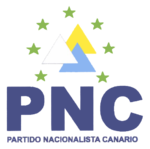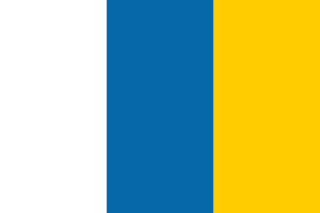
The flag of the Autonomous Community of the Canary Islands is a vertical tricolour of three equal bands of white, blue, and yellow. The state flag includes the coat of arms of the Canary Islands in the central band; the civil flag omits this. The designs were made official by the Statute of Autonomy of the Canarian Autonomous Community on 16 August 1982.

Canarian nationalism is a political movement that encourages the national consciousness of the Canarian people. The term includes several ideological trends, ranging from a demand for further autonomy within Spain to the right to self-determination.
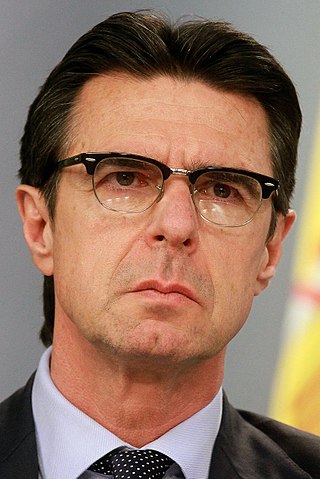
The 2011 Canarian regional election was held on Sunday, 22 May 2011, to elect the 8th Parliament of the Autonomous Community of the Canary Islands. All 60 seats in the Parliament were up for election. The election was held simultaneously with regional elections in twelve other autonomous communities and local elections all throughout Spain.
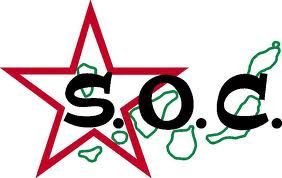
Sindicato Obrero Canario was a nationalist trade union movement in the Canary Islands. It was founded as an underground movement in 1976, under the leadership of the Canarian Communist Party (Provisional). The union was legalized in 1977.

Alternativa Popular Canaria is a Canarian nationalist leftist party founded in 2002, and part of the Movimiento de Liberación Nacional Canario (MLNC). Its creation was spurred by the youth organisation Azarug and several municipal parties, as well as members of various leftist nationalist parties.
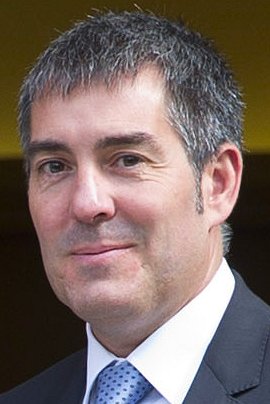
The 2015 Canarian regional election was held on Sunday, 24 May 2015, to elect the 9th Parliament of the Autonomous Community of the Canary Islands. All 60 seats in the Parliament were up for election. The election was held simultaneously with regional elections in twelve other autonomous communities and local elections all throughout Spain.

Canarian Nationalist Alternative is a Canarian left-wing nationalist political party, born in 2006 after a split of the People's Alternative for the Canary Islands (APC).
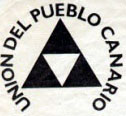
The Canarian People's Union was a left-wing nationalist political coalition operating in the Canary Islands. The party aim was self-determination for the islands and socialism. It was a coalition between various political parties and groups, with a communist, pro-independence or nationalist ideology.
Canarian Assembly was a left-wing nationalist political party operating in the Canary Islands. The party aims were self-determination for the islands, workers' self-management and socialism.
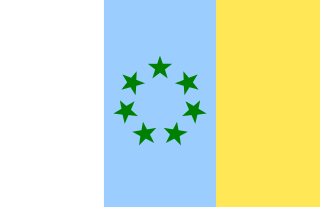
The Nationalist Canarian Initiative, initially called Canarian Initiative, was a nationalist political party in the Canary Islands founded in 1991.
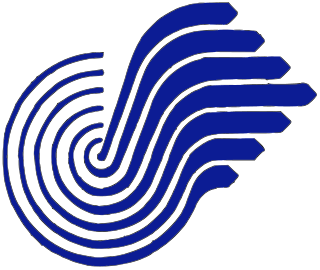
The Canarian Independent Groups were a Spanish political party based in the Canary Islands that existed from 1985 until its integration in Canarian Coalition.
The Canarian United People was a left-wing nationalist political coalition operating in the Canary Islands. The party aim was self-determination for the islands and socialism. It was a coalition between various political parties and groups, with a communist, pro-independence or nationalist ideology. The coalition received the support of the MPAIAC.
Communist Party of the Canary Islands (provisional) (Spanish: Partido Comunista Canario-provisional, PCC(p)), later Party of the Canarian Revolution (Spanish: Partido de la Revolución Canaria), PRC) was a Marxist-Leninist and Canarian nationalist political party operating in the Canary Islands. The party aim was self-determination for the islands and socialism.
Canarian Convergence was a centrist Canarian nationalist political party operating in the Canary Islands.

Nationalist Canarian Centre is a political party in the Canary Islands, founded in September 1992 as Independent Canarian Centre by former Canarian President Lorenzo Olarte from splinter elements of the Democratic and Social Centre. It was a member of Canarian Coalition from 1993 to 19 November 2005.
The Agreement of Nationalist Unity, frequently known under the name of its constituent parties, Canarian Coalition–Canarian Nationalist Party, was a permanent Canarian nationalist alliance formed by Canarian Coalition (CC) and Canarian Nationalist Party (PNC) in 2006 ahead of the 2007 Canarian regional election. The alliance has been renewed several times, in 2011, 2013 and 2018. For the 2011 and November 2019 general elections it was joined by New Canaries (NC). The alliance was dissolved in 2023, with the PNC arguing that the CC had now « nothing of nationalist »

Coalition for a Solidary Europe is an electoral list of regionalist parties that was formed to contest the 2019 and 2024 European Parliament election in Spain. The list is the de facto successor of the Coalition for Europe that ran in the 2014 and 2009 elections. Is formed by the Basque Nationalist Party (EAJ/PNV), Canarian Coalition–Canarian Nationalist Party (CCa–PNC), Proposal for the Isles, Geroa Socialverdes and Atarrabia Taldea.

The 2023 Canarian regional election was held on Sunday, 28 May 2023, to elect the 11th Parliament of the Autonomous Community of the Canary Islands. All 70 seats in the Parliament were up for election. The election was held simultaneously with regional elections in eleven other autonomous communities and local elections all throughout Spain.

Secundino Delgado Rodríguez (1867–1912) was a Canarian journalist and politician, considered by some to be the father of Canarian nationalism.
